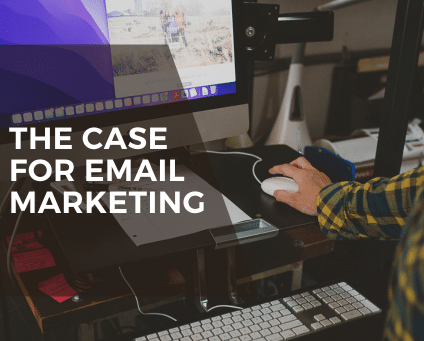Email marketing: It’s a term that strikes fear in the hearts of so many farmers and ranchers I’ve met. With a million things to do each day, taking the time to sit down and craft and send out an email can feel like an understandably daunting task.
But with such a large amount of “noise” to compete with online email marketing is a vitally important way to communicate with your customers – and has the biggest payoff.

But What About Social Media?
Before getting into the benefits of email marketing I wanted to touch on social media and why I consider it to be a secondary means of connecting with customers.
That might seem like a contradictory statement, but in reality it’s not nearly as effective. I like to think of the different social media platforms as rented ground that we have very little control over, especially as farmers and ranchers.
Facebook and Instagram in particular have very strict rules in regard to what can be posted about farming and animal agriculture (especially if it has any connection at all to the sale of livestock, livestock parts or products) not to mention that there can be a lot of backlash from users who may stumble upon your content and see it more as inflammatory than educational. All of this can often result in a loss of access to your accounts and all of the work put in to build a following – it’s happened to several of my friends!
The fact is that you can’t control exactly who is seeing what you post, or that your followers will see and interact with each and every piece of content you put out. On average each post on Instagram has a 0.88% engagement rate, with Facebook at 0.16%, Twitter at 0.03% and TikTok at 1.06% (Social Insider).
That’s not to say that there aren’t any benefits to using social media. It’s a great way to get to know and mingle with your community in a more casual way, but when it comes to generating sales, email marketing is worth investing more of your efforts in.
Why Email Marketing
We consider our email community as our VIPs and for very good reason – these are the people who have taken the extra step to take their interactions with you from passive to active. They gave you their email and consented to email marketing when they purchased something from you or they signed up for emails on their own.
No matter how they got there, these are members of your community who want to hear more from you. And the average email open rates of 25-50% for our industry support this!
Email marketing is your opportunity to create personalized content to you and your brand without having to conform to any kind of algorithm or censorship. It’s also a great way to tell and reinforce your story and brand identity while continuing to build trust.
Remember how I mentioned that we consider our email subscribers as VIPs? That’s because as a thank you for taking that extra step, they hear about product launches, restocks, promotions and other original content FIRST before it gets shared to social media. On many occasions our email subscribers buy up products long before we even have a chance to share elsewhere. That alone can be a huge incentive for your community to migrate to your email list.

Time Spent vs Your ROI
I know that one of the biggest challenges that farmers and ranchers face when it comes to any kind of marketing initiative is making the investment of time. For that reason I can understand why social media is sometimes the easier choice – we’re all on our phones already and sharing quick updates can happen at the touch of a button. But even with a small amount of extra effort, email marketing can have huge payoffs that are both monetary and trackable.
With email marketing you can use built in analytics to study the most effective times to send emails in regards to open rate. Some platforms even integrate with Shopify and other ecommerce platforms to allow you to actually track clicks and sales generated on products. Or, you can even make general associations by looking at sales trends based on recent email campaigns.
Social media on the other hand, while providing some analytics, cannot provide more detailed reports on exactly who is interacting with your content and if it resulted in a sale.
To put it simply, email marketing has a bigger ROI, a return on investment. Email marketing generates $26 for every $1 spent, while social media generates $2.80 for every $1 spent (Agency Analytics). But above all, when time is a limited resource you want to put your marketing efforts where they count the most, which is why email marketing is always worth the investment.

Related blog posts
- What we can learn from consumer trends
- Knowing your ideal customer for your farm
- Recommended butchery reference book

LEAVE A COMMENT
Comments